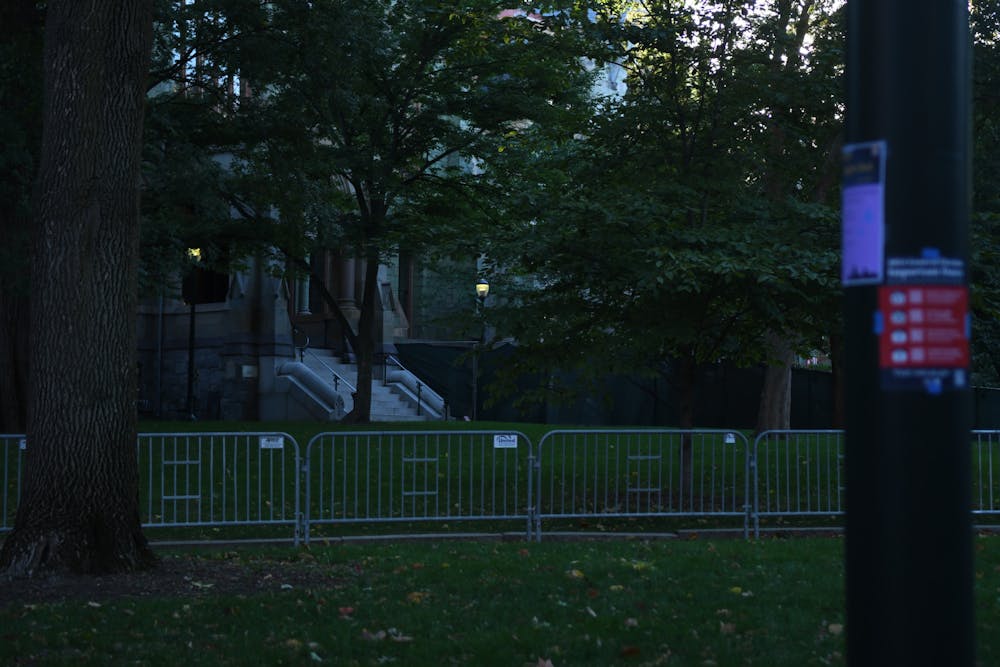
Penn is peaceful. The air is crisp as winter approaches, and the trees glow in the morning light, streaking Locust Walk with warm rays of copper and gold. If you don’t own a subscription to Fox News, The Daily Pennsylvanian, or any other news network, you might miss the fact that our beautiful campus, now more than ever, is a battleground. Or, maybe the constant presence of metal barriers surrounding College Green makes that evident enough.
It’s no secret that in the past year higher education has been gripped by scandal, particularly that relating to universities' handling of protests surrounding the war in Gaza. Whether it was the infamous Congressional trial on antisemitism in higher education—which led to the resignation of former Penn President Liz Magill,—or the viral images of Gazan children thanking student protestors, universities, including Penn, have faced a national reckoning.
But under President-elect Donald Trump’s new administration, this reckoning may be an enduring affair. Higher education is perceived by the new administration to be, as Yale Law graduate and Vice President-elect JD Vance put it, “the enemy.” Trump has promised to root out progressive ideology in higher education, describing accreditation (which is linked to an institution’s eligibility to participate in federal student aid programs) as the “secret weapon” capable of forcing ideological changes. During his previous term, he expanded the taxation of university endowments (though it’s important to note that Biden left this tax policy in place). Now, per the Heritage Foundation’s Project 2025, which outlines what the next Trump Presidency may look like, Trump could privatize student loans, roll back protections for trans students, and pare back diversity efforts on campus.
Even if none of these promises and potential policies are carried out, what is undeniable is the role higher education has already played on Trump’s presidential agenda—just look at some of his key cabinet picks who rose to stardom for their stances on-campus protests. United States Rep. Elise Stefanik (R-N.Y.), Trump’s pick for the U.S. Ambassador to the United Nations, rose to national prominence due to her questioning of Magill during the congressional hearing on campus antisemitism. Similarly, Marc Rowan, a 1984 Wharton graduate on the shortlist for Treasury secretary, spearheaded a donor backlash against Penn last fall over concerns about the University's handling of antisemitism that ultimately ended with the resignation of Magill.
Evidently, over the next couple of years the University, like other elite institutions, will continue to play a critical role in the “culture wars” gripping America. Whether it’s conflict over what books students are reading, what restrooms they're using, or what histories they’re learning, educational institutions have been and will remain battlefields in the clash between conservative and liberal values, as each side’s proponents scream about the other’s penchant for indoctrination. Yet, as much as conservatives say elite educational institutions (the Ivy Plus schools) are too woke or liberals that they’re too exclusionary, these institutions play a critical role in American culture.
However, I fear that the politicization of such institutions will continue to diminish their integrity in the eyes of the American people. Today, Americans’ faith in higher education is at an all-time low. When universities appear to be partisan, so too does the knowledge they produce. Thus, fact becomes political. It's no surprise then that as medicine is deemed politicized, vaccine denialism is spiking, or as historians are deemed indoctrinators, Holocaust denialism is rising. Universities have tried to decentralize politics from their official functioning, turning towards institutional neutrality in the hopes of convincing the public they, nor their expertise, is partisan. Everything seems to be political nowadays, from Disney princesses to Starbucks. America desperately needs higher education to remain unbiased, as apolitical, and thus as trustworthy as possible.
Students, in this Trump term, what we do, what we say, what we protest, and how we protest will be weaponized by both sides of the political spectrum. We must be cognizant of this fact. I’m not saying hide your political ideology or opinions (as an opinion writer, the idea is laughable), but what I am saying is to be aware that as a collective our actions can have national consequences. They can lead to congressional hearings, and the appointment of particular cabinet members, and weaken the trust placed in the knowledge we pursue. It may not be fair to place this burden on us, the students, but we do represent the institutions we attend. Together, we are the living body of Penn. Fair or not, we are the battleground.
SOLEMEI SCAMARONI is a College first year studying politics, philosophy, and economics from Houston, TX. Her email is solemei@sas.upenn.edu.
The Daily Pennsylvanian is an independent, student-run newspaper. Please consider making a donation to support the coverage that shapes the University. Your generosity ensures a future of strong journalism at Penn.
Donate






